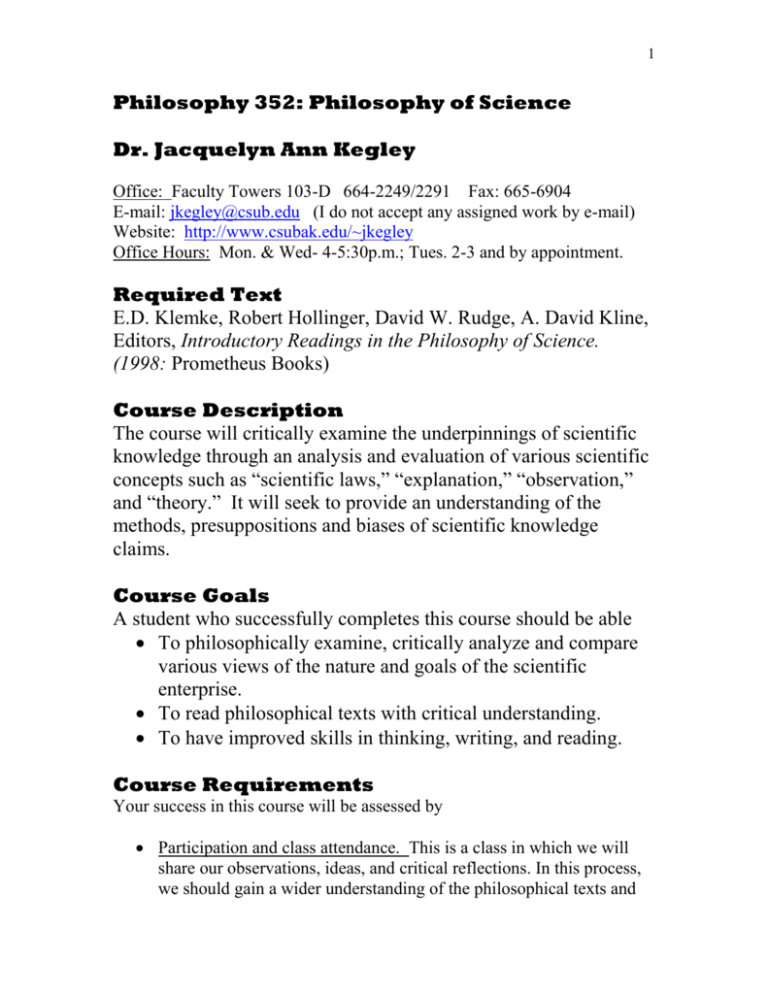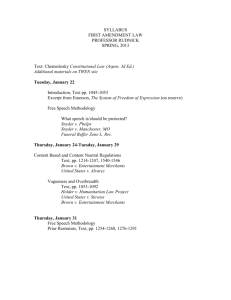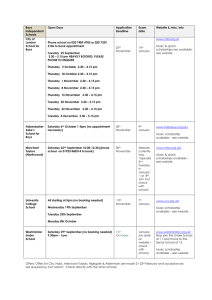Philosophy 352: Philosophy of Science
advertisement

1 Philosophy 352: Philosophy of Science Dr. Jacquelyn Ann Kegley Office: Faculty Towers 103-D 664-2249/2291 Fax: 665-6904 E-mail: jkegley@csub.edu (I do not accept any assigned work by e-mail) Website: http://www.csubak.edu/~jkegley Office Hours: Mon. & Wed- 4-5:30p.m.; Tues. 2-3 and by appointment. Required Text E.D. Klemke, Robert Hollinger, David W. Rudge, A. David Kline, Editors, Introductory Readings in the Philosophy of Science. (1998: Prometheus Books) Course Description The course will critically examine the underpinnings of scientific knowledge through an analysis and evaluation of various scientific concepts such as “scientific laws,” “explanation,” “observation,” and “theory.” It will seek to provide an understanding of the methods, presuppositions and biases of scientific knowledge claims. Course Goals A student who successfully completes this course should be able To philosophically examine, critically analyze and compare various views of the nature and goals of the scientific enterprise. To read philosophical texts with critical understanding. To have improved skills in thinking, writing, and reading. Course Requirements Your success in this course will be assessed by Participation and class attendance. This is a class in which we will share our observations, ideas, and critical reflections. In this process, we should gain a wider understanding of the philosophical texts and 2 hopefully will learn much from each other. Attendance and participation is thus mandatory. If you must miss class for a legitimate reason, please contact me ahead of time. Each unexcused absence warrants a five-percent reduction in the final grade. In addition to the necessity of attending class, you need to come prepared. This means that you have to read the entire assignment, have thought about it, and are ready to discuss it. Preparation for Class: You will be asked to hand in written answers to selected study questions in each section of the text. (These efforts will be worth 25%of the final grade.) You should also be prepared to discuss the case study and may hand in your analysis of that for extra credit. In all of your assignments, you must write grammatically correct English that is spelled correctly. You should use your dictionaries and consult the writing center if you need additional help. Mid-Term and Final Examination: These exams will require you to write critical, analytic answers to short essay questions. Each exam effort will be worth 20% of the final grade or a total of 40% of the final grade for both exams. Final paper: This paper is due on the last day of the class and a term paper proposal is expected April 27. Further instructions are provided below. This is worth 35% of the final grade. Final Paper Term paper proposal – Due April 27 This proposal should be about two printed pages identifying The topic you propose to explore in your term paper research, The sources you intend to use in your term paper research and The type of paper you expect to write (see below). Term paper - Due June 3 This paper should be about 10 printed pages not including bibliography. It should be a critical reflection on what you learned in your research for the paper on one of the following types of explorations. A partial history of some scientific or science-related concept, viewpoint, or theory. A critical exposition of two viewpoints related to science. 3 A critical exposition of a specific philosophical theory, spelling out its strengths and weaknesses. A defense of a prominent theory or viewpoint against specific criticisms. A case study of an important scientific experiment, discovery, or theoretical development and a discussion of its significance for some issue in the philosophy of science. PAPERS MUST BE YOUR OWN WORK. Plagiarism is grounds for failure of the course. Plagiarism includes the use of someone else’s ideas or words without giving the appropriate reference or credit. If you are in doubt, ask me. Letter grades and equivalents 93-100= A 83-86= B 90-92 = A80-82= B87-89 = B+ 77-79= C+ 73-76=C 63-66=D 70-72= C- 60-62+ D67-69= D+ Below 60 + F TENTATIVE SCHEDULE Tuesday, March 30 Introduction to some of the issues and history. Thursday, April 1 Read: Karl Popper, “Science, Conjectures and Refutations,”pp. 48-47; and John Ziman, “What is Science?” pp.48-53. Prepare to hand in Study Questions 1-5, p.100. Tuesday, April 6 Read: Carl Hempel, “Studies in the Logic of Explanation,” pp. 206-224. Prepare to hand in Study Questions, 2-5. 4 Thursday, April 8 Read: Karl Lambert and Gordon Britten, “Laws & Conditional Statements.” 225-232; and Nancy Cartwright, “The Truth Doesn’t Explain Much,” pp. 233-240. Prepare to hand in Study Questions 7-16. Tuesday, April 13 Read: Wesley Salmon, “Scientific Explanation: How We Got From There to Here,” pp.241-263. Study Question 20. Thursday, April 15 Read: Bras C. van Frassen, “The Pragmatics of Explanation,” pp. 264-277 and Philip Kitcher, “Explanatory Unification,” pp. 278-301. Study Questions: 19,22,23,24 and 25. Thursday, April 20 Read: Rudolf Carnap, “The Nature of Theories,” pp. 316-332. Study Questions: 1-2 Tuesday, April 22 Read: Hilary Putnam, “What Theories Are Not,” 333-337; N.R. Hanson, “Observation,” pp. 339350; and T. Stace, “Science and the Physical World,” 351-357. Study Questions: 3-8. Term Paper Proposals Due Thursday, April 27 Read: Stephen Toulmin, “Do Sub-Microscopic Entities Exist?” pp. 358-373. Study Questions 9 and 10. _____________________________________________________________ Thursday, April 29 Read: Carl A. Matheson & A. David Kline, “Is There a Significant Observational-Theoretical Distinction?”pp. 374-389. Study Questions 11-14. 5 Tuesday, May 4 Read: Ernan McMullin, “A Case for Scientific Realism.” – handout. We will return to this piece again later in the quarter. Thursday, May 6th Mid-Term Examination Tuesday, May 11 Read: W.V. Quine & J.S. Ulian, “Hypothesis,” pp. 404-414. Study Questions: 1-5 Thursday, May 13 Read: Ronald Giere, “Justifying Scientific Theories,” pp. 415-434. Study Question 6. Tuesday, May 18 Read: Thomas S. Kuhn, “Objectivity, Value Judgment and Theory-Choice,” pp. 435-450. Study Question 9. Thursday, May 20 Read: Carl C. Hempel, “Scientific Rationality: Analytic vs. Pragmatic Perspectives,” pp. 450-464 & Philipp G. Frank, “The Variety of Reasons for the Acceptance of Scientific Theories,” pp.465475. Study Questions: 10 & 12-16. Tuesday, May 25 Read: Richard Rudner, “The Scientist Qua Scientist Makes Value Judgments,” pp.492-498 & Carl G. Hempel, “Science and Human Values,” 499-14. Study Questions: 1-3. 6 Thursday, May 27 Read: Ernan McMullin,” Values in Science,” pp. 515-538. Study Questions: 4-7. Helen E. Logino, “Can There Be a Feminist Science?” Read: Robert Hollinger, “From Weber to Habermas,” pp. 539-549. Questions 8-11. _____________________________________________________________ Tuesday, June 1 Thursday, June 3 Read: Ronald Giere, “The Feminist Question in The Philosophy of Science,” pp. 550-564. Study Questions 12-10. RESEARCH PAPER DUE






